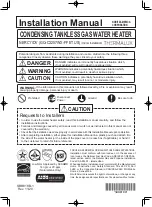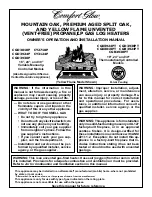
3
17.
Do not use an extension cord because the extension cord may overheat and cause a risk of fire.
However, if you have to use an extension cord, the cord shall be UL listed No. 1 4 AWG minimum
size and rated not less than 1,875 watts, 15AMP at 125 V and has to be used only for supplying power
to this heater.
18. Be sure that the plug is fully inserted into an appropriate receptacle. Please remember that
receptacles also deteriorate due to aging and continuous use: check periodically if signs of
overheating or deformations are evidenced by the plug. Do not use the receptacle and CALL your
electrician.
19. Check that neither the appliance nor the power cable have been damaged in any way during
transportation.
20. Before connecting to electric power outlet, check your electrical power supply. It must be 120
volts A.C. (alternating current). The outlet may be 15 amp. or 20 amp. The circuit must be of
adequate size and must be protected by fuse or circuit breaker. DO NOT place heater directly
beneath electrical receptacle and DO NOT place heater against paper board or low density
fiberboard.
DO NOT touch hot surfaces.
21. DO NOT immerse cord, plug or heater in water or other liquid, this will cause dangerous
electrical conditions and potential electrical shock.
DO NOT obstruct the top or bottom air openings.
Dust and lint on the heating element can obstruct the free flow of air. DO NOT operate when
so obstructed.
See MAINTENANCE. Operating with air openings obstructed could cause a dangerous
condition.
22. Make sure that no pieces of polystyrene or other packaging material have been left in the
appliance. It may be necessary to pass over the appliance with a vacuum cleaner.
23. When switching on the appliance for the first time, allow it to run at full power for about two hours
to get rid of the unpleasant smell. Make sure that the room in which the appliance is located is
well ventilated during this operation. It is normal for the appliance to emit small cracking sounds.
24. It is not advisable for the appliance to be positioned where it is exposed to draughts which might
prevent it from working properly.
SAVE THESE INSTRUCTIONS






























